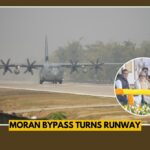Volcanic ash from Ethiopia’s Hayli Gubbi eruption drifted into Delhi’s airspace late Monday, prompting India’s aviation authorities to issue an urgent safety advisory for airlines.
Meteorological agencies reported that the ash cloud entered India through western Rajasthan before moving northeast at speeds of around 120–130 km/h. The eruption – the first from the Hayli Gubbi volcano in nearly 10,000 years – sent a massive plume of ash and sulphur dioxide up to 15 km into the atmosphere.
In response, the Directorate General of Civil Aviation (DGCA) instructed airlines to avoid flying through affected zones, review routing and fuel plans, and brief pilots on procedures for navigating volcanic-ash conditions.
Though the ash layer remained at high altitudes and was unlikely to affect take-offs or landings in Delhi immediately, some flight routes intersecting the plume corridor had already seen disruptions. Airlines said they were closely monitoring the situation.
Experts noted that while ground-level health risks are expected to remain low, the ash may temporarily alter sky conditions and add to the region’s already stressed air quality. Weather agencies continue to track the plume’s movement across northwest India, warning that further aviation-related impacts cannot be ruled out.







